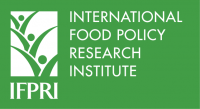
Policy Seminar: Nutrition-sensitive agriculture program in Burkina Faso improves children's nutritional outcomes
This post originally appeared on the IFPRI.org blog . Written by Smita Aggarwal.
A nutrition-sensitive agriculture program designed to address underlying causes of undernutrition had positive results for children in Burkina Faso—reducing anemia, stunting, and iron and vitamin A deficiencies—according to recent research conducted by IFPRI and Helen Keller International ’s (HKI) Creating Homestead Agriculture for Gender Equity (CHANGE) program. A recent IFPRI policy seminar, co-hosted by Agriculture for Nutrition and Health (A4NH) , focused on the program’s key results.
The CHANGE-Burkina Faso program design and evaluation are the result of a 10-year collaboration between IFPRI and HKI that led to iterative improvements in both programming and evaluation design.
CHANGE was designed to improve the nutritional status of children up to a year old at enrollment. It provided mothers with young children with inputs to grow a home garden and to raise chickens. In addition, mothers (and interested fathers) were taught about optimal agriculture, health, hygiene, and nutrition practices; the program also included a focus on gender equity, explained Stella Nordhagen , regional monitoring and evaluation advisor in Africa, HKI.
In addition to the production inputs and training, program participants in 45 of the 60 participating villages received a Water, Sanitation and Hygiene (WASH) intervention, while 15 from that smaller group also received monthly supplies of daily doses of small-quantity of lipid-based nutrient supplements (LNS) for children aged 6 to 24 months. Providing extra inputs in this manner allowed the evaluation team to assess the added benefits of including WASH and LNS in addition to the production and behavior change communication (BCC) interventions.
After two years, the study found that among children who entered the CHANGE programs aged 0 to 12 months and were then 12 to 36 months old, the prevalence of anemia had decreased by 15 percentage points. Adding WASH reduced anemia by an additional 11 percentage points; adding LNS in addition to WASH and the other activities resulted a decline of 13 percentage points.
“The group of children that received all program interventions and whose villages had previously participated in the program had significantly greater reductions in the prevalence of iron deficiency, iron deficiency anemia, vitamin A deficiency and stunting,” said Deanna Olney , senior research fellow, IFPRI.
The CHANGE results provide evidence that partnerships combining research with implementation can improve program effectiveness over time, she said.
Marie Ruel , director of IFPRI’s Poverty, Health, and Nutrition Division, said the partnership with HKI has brought together high-quality programming with rigorous evaluation, helping to improve program effectiveness.
“The CHANGE program is designed to achieve impact,” said Victoria Quinn , HKI senior vice-president for programs. Yet, for all its measurable success, she said, more investment in research is needed to further the understanding of how agriculture programs can work to improve nutrition.
Amy Baker , director-general, health and nutrition bureau at Global Affairs Canada—the project’s principal funder—said that nutrition is a critical part of the department’s vision, and that women and girls are at the center of efforts to meet Canada’s commitment towards the Sustainable Development Goals (SDGs). She also emphasized on the need for sex-disaggregated data and importance of working across sectors to achieve developmental goals.
Beth Dunford , assistant to the administrator and deputy coordinator for Feed the Future, USAID, said that evidence-based results drive programming. As the Feed the Future program enters its phase two, USAID is looking at taking a more holistic view of nutrition, including the impacts of WASH, throughout the value chain, Dunford said.
Delivering concluding remarks, Rolf Klemm , vice-president for nutrition, HKI, focused on the importance of maintaining productive communication between researchers and implementers and emphasized the need to assess spillover benefits to individuals and communities.
Smita Aggarwal is an IFPRI Communications Specialist.
